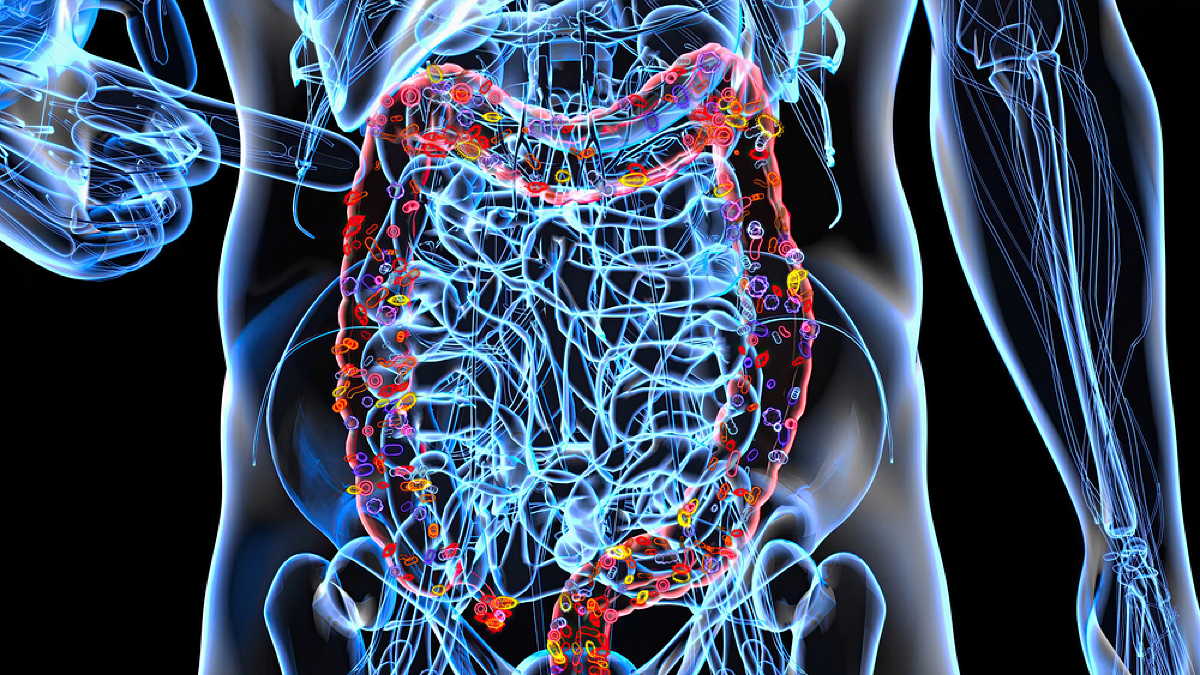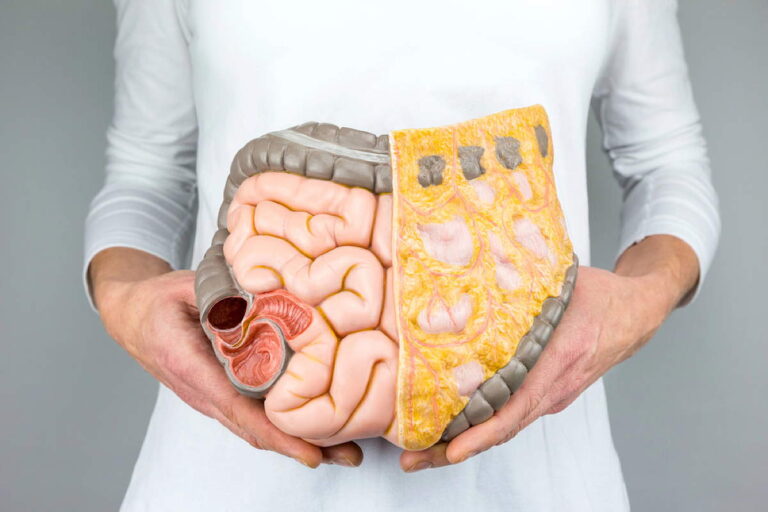Microbiome & longevity: Why your gut holds the secret to ageing
Did you know that a high fiber intake can significantly reduce the risk of cancer? This surprising statistic highlights only a small part of the crucial role our gut health plays in overall wellbeing and longevity. Current research shows that the microbiome, particularly that in the gut, not only aids digestion and the immune system, but also has a direct impact on longevity. The importance of the microbiome to our health and ageing cannot be overstated.
With the growing megatrends in prevention and personalized medicine, the question arises: could taking care of your gut health be a key element to a longer and healthier life? Research suggests that the right balance of gut flora can make a significant contribution. The anti-inflammatory properties of selenium and its role in the immune system are just a small but important piece of the puzzle.
Important findings
- A well-maintained intestinal flora supports digestion and the immune system.
- A healthy microbiome can have a positive influence on life expectancy.
- Dietary fiber can significantly reduce the risk of cancer.
- Selenium plays a key role in the immune system, brain function and cardiovascular health.
- Megatrends in prevention and personalized medicine highlight the importance of healthy gut flora for a longer life.
The importance of the microbiome for your health
The microbiome consists of trillions of microorganisms that live in our body, mainly in the intestine. These microbes play an important role in digestion and the production of vitamins. Research such as that conducted by Dr. Heiko Hofmann shows that a healthy microbiome composition is crucial for preventing disease and promoting longevity.
What is the microbiome?
The human microbiome comprises an average of 30 to 100 trillion microbes, 99% of which live in the gut. These microbes weigh between 1 and 2 kilograms in total. There is a close relationship between the microbiome and health, as a disturbance of the intestinal flora can lead to various diseases such as allergies, asthma, diabetes mellitus, depression and even autism. The composition of the microbiome is significantly influenced by diet, environmental influences and stress. Factors such as prolonged use of antibiotics and unhealthy gut-healthy foods contribute significantly to disorders.
How the microbiome works
The microbiome communicates with the brain via the vagus nerve and transport vesicles that transmit messages and substances between the gut and the brain. A poor state of the microbiome can lead to an increased number of transport vesicles in the blood that carry potentially harmful information to the brain. Because of this two-way communication, a healthy microbiome composition also supports mental health. Emulsifiers such as carrageenan and xanthan gum, commonly found in industrial foods, have been associated with significant damage to the intestinal mucosa in mouse studies.
The microbiome as a mirror of health
The composition and health of the microbiome can be seen as indicators of overall health. A healthy microflora reduces susceptibility to dangerous germs and supports effective immune responses, as about 80% of immune responses originate in the gut. Depending on the health of the microbiome and the diet, the number of different microbial strains can vary. Personalized microbiome analysis may be possible in 1 to 2 years to develop more precise health strategies.
How does gut health affect life expectancy?
The effects of intestinal health on life expectancy are a highly topical research subject. Studies show that healthy intestinal flora not only regulates inflammatory processes and strengthens the immune system, but can also have a positive influence on ageing. Gut health therefore contributes to a longer life.
Connection between intestinal flora and longevity
A fascinating study examined the turquoise killifish, whose lifespan is only a few months. It was observed that older fish models live around 40 percent longer if they receive intestinal bacteria from younger conspecifics. These fish remained agile into old age, an indication that healthy intestinal flora has a direct influence on extending life expectancy. Another study of 1,575 people showed that centenarians exhibited a unique pattern of diversity and stability in their microbiome.
Scientific studies on the topic
The importance of gut health and longer life is also underpinned by numerous other scientific studies. A publication in Nature Aging revealed that as we age, beneficial bacteria such as Bifidobacterium and Lactobacillus decline. This dysbiosis promotes inflammatory processes known as “inflamm-aging”, which play a key role in the development of age-related diseases. Chronic inflammation increases the risk of diseases such as type 2 diabetes and neurodegenerative diseases such as Alzheimer’s.
“Chronic inflammation caused by an imbalance in the microbiome often leads to muscle loss and thus to restrictions in mobility and quality of life.”
These studies highlight the effects of gut health on life expectancy and support the assumption that a stable and diverse gut flora plays a fundamental role in a healthy and long life.
Nutrition for healthy intestinal flora
A balanced diet plays a crucial role in promoting healthy intestinal flora. Thousands of strains of different bacteria live in the human intestine, which together weigh an estimated one to two kilograms. These bacteria, especially in the large intestine, help with the utilization of food components and prevent the spread of pathogens.
Essential nutrients
Various nutrients are essential for healthy intestinal flora. Insoluble fiber, which is found in whole grain products, legumes and mushrooms, promotes intestinal health. Soluble fiber, which can be found in foods such as chicory, leeks, asparagus, salsify, oatmeal, nuts, psyllium and unripe bananas, also supports the microbiome. Polyphenols, which are found in kale, berries and nuts, serve as a food source for healthy gut bacteria.
Microbiome-friendly foods
Eating microbiome-friendly foods ensures that the microbiome is well nourished. One example is the “five a day” diet rule, which recommends eating three large handfuls of vegetables and two handfuls of fruit a day. Breaks between meals are also important as they allow the gut to cleanse itself. Foods such as yogurt, kefir and sauerkraut, which contain lactic acid bacteria, support healthy intestinal flora.
Probiotics and prebiotics
Probiotics and prebiotics play a central role in the diet for healthy intestinal flora. Probiotics are living microorganisms that have health-promoting effects on the intestinal flora and are found in probiotic foods such as yogurt and kefir. They must be present in sufficient quantities and survive the passage through the stomach and small intestine in order to develop their effect. Prebiotics, on the other hand, are dietary fibers that promote the growth of healthy bacteria in the intestine. A daily intake of around five grams of prebiotics is recommended to ensure a positive effect on the intestinal flora. Prebiotics are found in foods such as chicory, Jerusalem artichokes, onions and artichokes.
Gut-healthy foods
A balanced diet plays a crucial role in gut health and a longer life. Foods rich in probiotics and prebiotics provide optimal support for the microbiome. Foods such as sauerkraut, kimchi and whole grain products are particularly valuable as they help to strengthen the intestinal flora and reduce the risk of disease.

Top foods for a healthy gut
There are a variety of foods that are specifically known to promote gut health. Here are some of the most important ones:
- Fermented foods such as yogurt, sauerkraut and kimchi contain probiotics that improve the balance of the intestinal flora.
- Fiber-rich foods such as whole grains, beans and legumes help with digestion and promote the growth of beneficial bacteria.
- Fresh fruit and vegetables provide essential nutrients and contribute to gut health by providing prebiotic fiber.
Recipes for gut health
Incorporating gut-healthy foods into your daily diet can be incredibly easy. Here are some recipes specifically aimed at strengthening the microbiome:
- Probiotic smoothie: Mix a cup of yogurt, a banana, a handful of berries and a spoonful of honey. This smoothie provides a good dose of probiotics and antioxidants.
- Kimchi rice pan: Fry rice with vegetables and kimchi. This dish combines prebiotics and probiotics and is both tasty and healthy.
- Wholemeal salad: Cook wholemeal bulgur and mix it with chopped vegetables, nuts and a dressing of olive oil and lemon juice. This salad is high in fiber and supports healthy digestion.
Gut health and longer life are closely linked. By incorporating these gut-healthy foods into your diet, you can not only strengthen your microbiome, but also enjoy general health benefits.
Gut health and the immune system: a close connection
The gut plays a crucial role in the immune system. Over 80% of immune cells are located in the intestinal tissue, which strongly emphasizes the importance of gut health and immune system connectivity. The gastrointestinal tract contains the majority of immune system cells and sends about nine times as much information to the brain as it receives in commands from the brain.
How the gut strengthens the immune system
Maintaining a healthy intestinal flora not only strengthens the immune system, but also reduces susceptibility to infections. Probiotics containing lactobacilli and bifidobacteria are important for maintaining the diversity of intestinal bacteria. These microorganisms support the immune defense and help to maintain a healthy balance in the intestine.
Prevention through gut health
A healthy gut flora is also crucial for prevention through gut health. A balanced diet that includes fresh vegetables, fruit, whole grains, fish, meat and dairy products promotes the diversity of gut bacteria and contributes to overall health. Regular exercise can also improve gut health, which in turn supports the immune system. People who are regularly physically active are less likely to suffer from constipation or bloating, emphasizing the close link between gut health and the immune system.
Effects of gut health on life expectancy
The effects of gut health on life expectancy are now well documented. The human gut harbors about 2,000 species of bacteria, which exceeds the number of human cells and genes. However, as we age, the diversity of the microbiome decreases, especially in beneficial bacteria such as Bifidobacterium and Lactobacillus, while harmful bacteria such as Proteobacteria increase.
According to recent studies, there is a significant link between healthy gut flora and increased life expectancy. Older people who suffer from chronic inflammation often have an unhealthy microbiome. This can lead to age-related diseases such as type 2 diabetes, cancer and neurodegenerative diseases such as Alzheimer’s.
Excitingly, centenarians, especially those in the “Blue Zones”, often show a more resilient and diverse microbiome, which contributes to their remarkable longevity. Studies show that moderate physical activity and specific diets, such as the Mediterranean diet, can help optimize gut health.
Another notable finding is that a greater diversity of microorganisms in the gut is associated with a lower susceptibility to age-related diseases. For example, prebiotics such as inulin have been shown to promote the growth of beneficial bacteria and increase the production of short-chain fatty acids.
Fecal microbiota transplants (FMT), which have been successful in older people with Clostridioides difficile infections and have the potential to treat other gut problems, are particularly important. A robust and diverse microbiome has a preventative effect against age-related diseases and therefore supports healthy ageing.
In conclusion, the effects of gut health on life expectancy are extensive and profound, and are increasingly seen as the key to a longer and healthier life.
Tips for healthy digestion
A healthy digestive system is essential for our well-being and overall health. The following tips for healthy digestion can help keep your digestive system running smoothly and prevent symptoms such as bloating, constipation and diarrhea.
Regular exercise
Regular physical activity is one of the most important tips for healthy digestion. Exercise stimulates bowel function, which is particularly beneficial for people with digestive problems. Studies show that aerobic exercise in particular, such as running or cycling, can stimulate bowel function and reduce the frequency of constipation.
In addition, it is recommended to integrate simple exercises such as walking after meals into your daily routine. This can help to digest food more easily and improve overall well-being.
Stress management
Another important factor for healthy digestion is effective stress management. Stress hormones such as adrenaline can reduce gastrointestinal activity and lead to complaints such as irritable bowel syndrome or stomach pain. It is therefore important to incorporate stress management techniques such as yoga, meditation or conscious breathing into everyday life.
Chronic stress can have a negative impact on the intestinal flora and impair intestinal health. Regular breaks, sufficient sleep and leisure activities can help to reduce stress and thus support digestion. Statistics show that a healthy work-life balance and a stable social support network can also have positive effects on digestion.
Hydration and fluid intake
A crucial aspect of healthy digestion is adequate hydration. At least 2 liters of water per day is necessary to prevent constipation and soften stools. Adequate fluid intake not only promotes general health, but also helps to flush harmful substances from the body and support the function of the digestive organs.
- Recommended daily intake of dietary fiber: 30 grams
- Recommended number of chewing units per bite: 20 to 50 times
- Recommended daily fluid intake: at least 2 liters
Tips for healthy digestion also include eating slowly and chewing well to make food easier to digest and improve nutrient absorption. These are simple steps that can have significant benefits for gut health.
Gut health and a longer life
A healthy gut flora is not only important for digestion, but also a key factor for a longer life. Current research shows that over 100 trillion microorganisms in the human gut make up the complex microbiome, which plays a crucial role in health. These microorganisms help the body to extract nutrients, neutralize toxic substances and strengthen the immune system.
It is noteworthy that in regions with high life expectancy, such as Okinawa and Sardinia, people consume high-fiber and plant-based diets. This diet promotes the number of beneficial bacteria in the gut and inhibits the growth of harmful germs. A change in diet from an animal-based to a plant-based diet can bring about a significant microbiological shift within 24 hours.
According to studies by Lund University, dysbiotic intestinal flora can accelerate the progression of Alzheimer’s disease. The prevention of such age-related diseases is closely linked to gut health. Around 90 percent of the factors that influence lifespan are lifestyle-related, while genes only account for around 10 percent. This underlines the importance of a healthy gut flora for a longer and healthier life.
The highest life expectancy is observed in countries with high-fiber and low-fat diets. Studies show that healthy older people have a diversity of gut bacteria that produce anti-inflammatory metabolites. This diversity and the associated health benefits emphasize the importance of a focused diet and lifestyle to promote gut health and therefore longevity.
A varied diet with more whole grains, fruit, vegetables, fish and nuts is crucial for gut health and a longer life. Fermented foods such as yogurt and kimchi, which contain probiotics, also contribute to the diversity and health of the microbiome. Overall, a healthy and diverse diet has a positive effect on the microbiome, which in turn can delay biological ageing.
Prevention of intestinal diseases
A healthy microbiome lies not only in a balanced diet and avoiding processed foods, but also in a combination of regular early detection and prevention. These measures are crucial for the prevention of intestinal diseases.
Early detection and prevention
Regular use of innovative tests and screenings can be life-saving in the early detection of bowel disease. One example of this is the modern home test kits, which offer a convenient and quick way to check bowel health. Combined with a high-fiber diet that includes about 30 grams of fiber daily, these measures contribute significantly to the prevention of bowel disease.
Common intestinal diseases and how to avoid them
Common intestinal diseases, such as irritable bowel syndrome or chronic inflammatory bowel disease, can largely be avoided by adopting a healthy lifestyle. A balanced diet with a high intake of fiber and natural probiotics, such as natural yogurt with live yogurt cultures, supports a healthy microbiome. In addition, the consumption of red and processed meat should be reduced, as these are considered risk factors for bowel cancer.
In addition, regular physical activity and effective stress management can promote gut health. It is recommended to consume probiotics at least every other day to constantly support the microbiome. Such preventative measures not only help to keep the gut healthy, but also contribute to an overall sense of well-being.

Innovative tests for monitoring the intestinal flora
Modern technologies offer a variety of ways to monitor gut health. From home test kits to laboratory diagnostics to digital health platforms, these innovative gut flora monitoring tests allow people to gain deep insights into their microbial composition.
Home test kits
One of the most popular home test kits is the myBioma test kit, which is available for 169.90 euros. The analysis report comprises 40 pages and provides detailed insights into the intestinal flora. Results are available in 4 to 6 weeks. The analysis identifies three enterotypes:
- Enterotype 1: Dominance of Bacteroides, frequently found in western diets.
- Enterotype 2: Dominance of Prevotella, often with a high-fiber diet.
- Enterotype 3: Dominance of Ruminococcus, the health significance of which has not yet been fully researched.
Laboratory diagnostics
Laboratory diagnostic tests offer more specialized and in-depth insights into the microbial composition and function of the gut flora. Researchers have found that positive effects of a high-fiber diet promote the growth of beneficial gut bacteria. Studies from 2015 and 2010 have shown that bifidobacteria can have anti-tumor effects and slow down the aging process.
Digital health platforms
Digital health platforms complement testing and provide interactive reports and personalized health advice. Centenarians show a greater diversity of gut bacteria compared to younger individuals, with Akkermansia muciniphila, Christensenellaceae and Bifidobacterium associated with exceptional longevity. Such platforms help to apply these findings and maximize the health benefits.
Success stories: How healthy gut flora has changed lives
Success stories about gut health impressively demonstrate how optimized gut flora can significantly improve life. One notable example is the reception of Giulia Enders’ book “Darm mit Charme”, which has been published in 40 countries and has been a bestseller for over 20 years. This massive response illustrates the broad interest and importance of the topic.
Particularly interesting stories concern the influence of gut health on mental wellbeing. Research suggests that the balance of gut bacteria can influence mood in the long term. One Portuguese journalist even reported that after reading Enders’ book, she was inspired to examine her own stool sample for the first time at the age of 35 – a clear sign that cultural taboos around gut health are being broken.
In the so-called “Blue Zones”, regions with exceptionally high life expectancy, a more robust microbiome is widespread. These regions impressively demonstrate how a healthy gut flora can make a decisive contribution to a long and healthy life. At public events, Enders repeatedly emphasizes the importance of becoming aware of one’s own intestinal health in order to avoid anxiety and health problems.
Chronic inflammation caused by a disturbed microbiome contributes significantly to age-related diseases. The loss of beneficial bacteria such as Bifidobacterium and Lactobacillus species increases with age, while potentially harmful microorganisms increase. However, the success stories mentioned above make it clear that with targeted measures to promote gut health, every individual can significantly improve their quality of life and lifespan.






